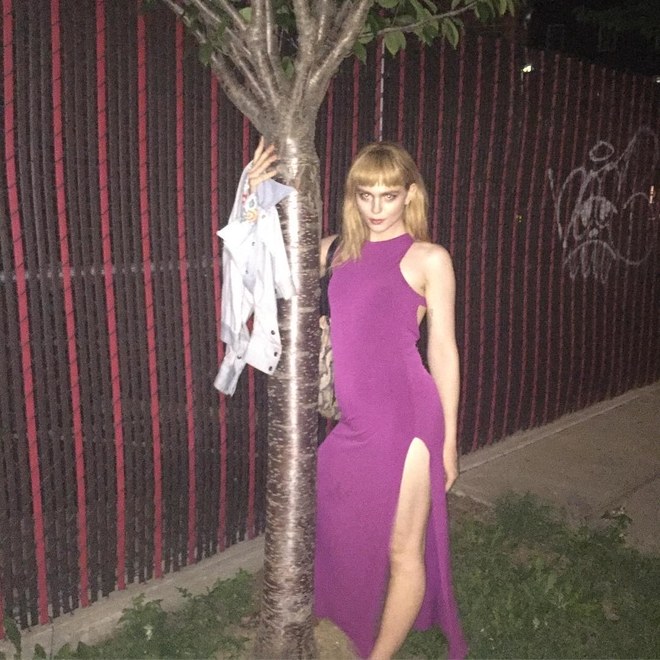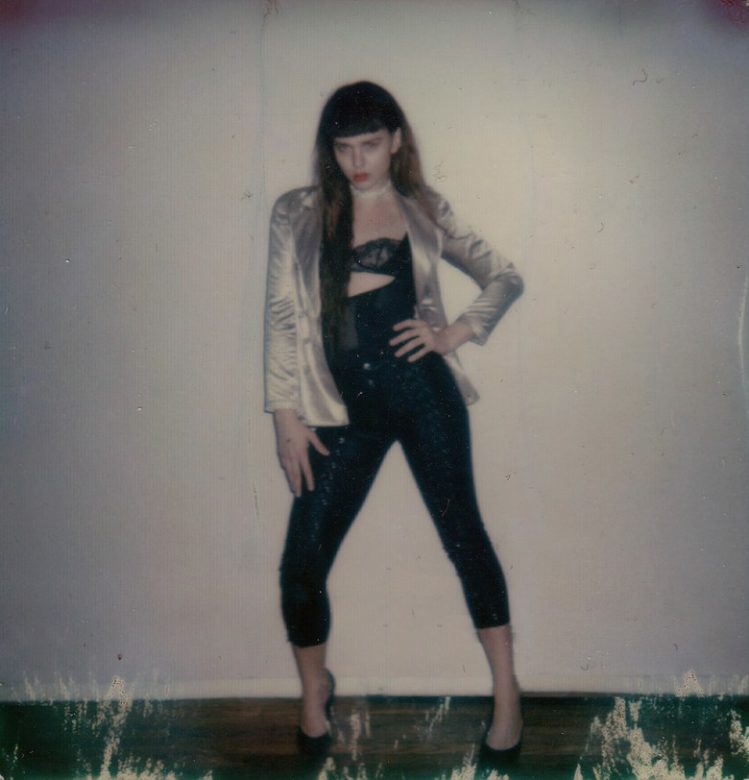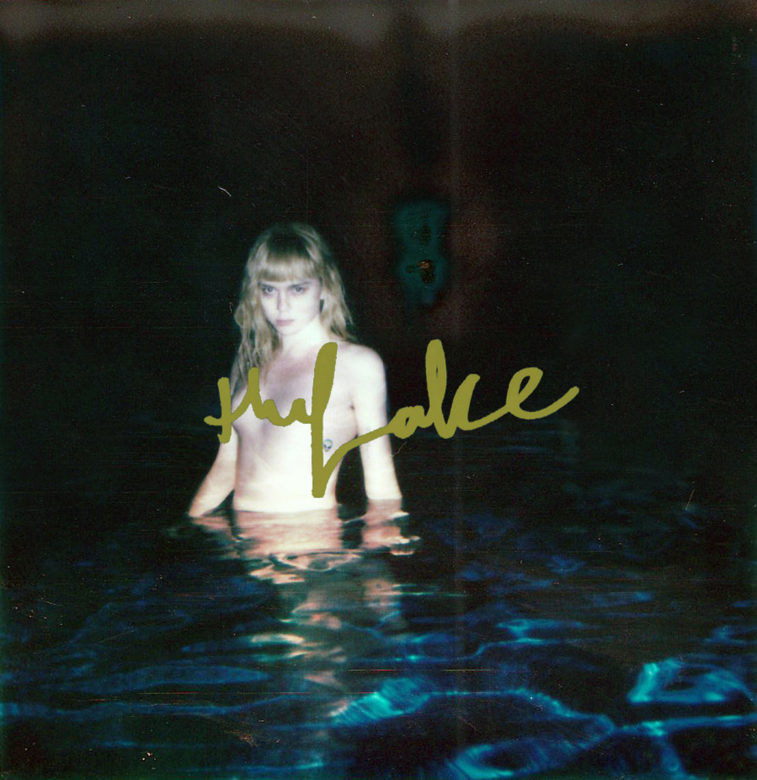
A beloved fixture in Brooklyn’s queer scene, Macy Rodman first caught our attention a couple years ago with her irreverent viral smash, “Lazy Girl.” On her full-length debut album The Lake, she’s flexing her impressive musical range, bending genre conventions, and staking her claim as an artist to watch out for.
!! omg blog !! guest writer Eric Kostiuk Williams got a chance to chat with Macy about her upbringing, musical influences, the NYC hustle, and quickly came to realize she ain’t so lazy, after all!
Read the full Q&A after the jump.
�
Eric: I saw that you performed at Bushwig last night. How’d it all go?
Macy: Yes! It was really fun. It was like, a huge crowd, bunch of young kids, bunch of people from across the country, and the world. People flew out to see it. Yeah, it was amazing. This huge venue, the Knockdown Center. There’s a huge outside yard. I mean, it’s just massive.
When did you first know you were passionate about music, and when did you decide to pursue it more seriously?
Me and my sister, growing up… My sister is a drum prodigy, basically, and plays every instrument, so we would always hang out in the garage and cover songs that we loved and mess around. I went to college for two years and then dropped out, and after that I was like, “Well, better time than any to try to pursue this.”
Who were some major artistic influences growing up?
Growing up, I had super eclectic influences because of the radio. I grew up in Alaska, and the radio is bizarre. It’s kind of like you get hit songs a little bit too late, and some of them fall through the cracks. Shania Twain was big in our house. Janet Jackson, but also like, System of a Down. Totally random, growing up. But then, when I was a teenager, I got obsessed with emo and post-punk types of acts, like My Chemical Romance, and oh God… What was Skrillex’s band before?
Oh my God…
From First To Last!
Yes!
[Laughs] And the pop girls. I loved Kelis, and Britney, obviously.
Nice… I can kind of see all of that converging in your music.
[Laughs]
Your video for “Lazy Girl” was how a lot of us were first introduced to your work. It’s hilarious, well put together, and relatable. How did it all come about?
I love that video so much. I worked on it with Josef Kraska, who directed it and shot it all, and did all the animation. Working with him is really great, because we both work in a really improvisational way. I’d seen his work before, and thought it was perfect for the song. So we got together for it, and just knocked it out, and yeah, that’s one of my favorite videos.
Mine too.
He did “Strawberry Margarita” as well.
A lot of your songs feel very autobiographical, especially on your first EP Help. They range from funny and absurd to deep and confessional. How was it, putting those together and performing them live for the first time?
Help was an interesting experience, performing live, because it was based on this idea of pop music, or like, music made for clubs, and so we were experimenting with computerizing and sampling my voice a lot just to make it as catchy as possible. So performing that live was a bit of a challenge. It always ended up being something different. I liked that about it, but that kind of bled over into the making of this album, The Lake, because the focus was really trying to get something where the live element was present in the recording.
For us Toronto people, we have a fond, if slightly blurry and drunken, memory of you performing at the Hotnuts party almost two years ago. At that point, we’d mostly known the funnier, poppier side of you from the “Lazy Girl” video, and you performed that, along with all the other great cuts off your first EP. But I remember at the end, you broke away and covered “I Try,” originally performed by another Macy.
Oh, yeah!
And I remember I freaked the fucked out, because the full power and intensity of your voice came through. Everyone knew a bit of your work, but I don’t think they were expecting where you took it. Is it right to say that some of that energy is coming through more fully on the new album?
Yes, absolutely. I love getting a mix in there, because I wouldn’t want my performance to ever be like, so serious or a comedy routine. I wouldn’t want it to be one or the other. So I always try to meet somewhere in the middle. But yeah, on this album, I was really trying to exploit that kind of intensity and see where I could go with my voice.
The new album really bends and breaks genre in a wonderful way. There’s some bouncy club jams, but also stuff that’s a lot harder, almost industrial. You were saying you were hands-on with everything from songwriting to production, so which song was the most exciting to put together, and which one presented the biggest challenge for you?
The most exciting songs to put together were “Skinny Fucked Up Boy” and “Born,” because I was able to be really minimal in a way that I didn’t know I could do, and that was really freeing, just to build something up from bare bones and not over-analyze anything with the production. Just like, ramp it up where it needed to be ramped up, but leave it bare where it could be bare.
And the most challenging I think was “Martina,” because that’s like the second-to-last song. It’s probably the most vulnerable song on the album, and it’s got a little bit more of a complicated, analogue sounding production. So I felt a little bit out of my element, but I really wanted to get that out. So that was challenging, but in the end, I was happy with how it turned out.
With technology and resources becoming more available, we see musical production opening up to a ton of folks who couldn’t really access it before. Do you have any advice for aspiring producers who are wanting to get more hands-on like you have?
I would just say just go for it. You’re not gonna learn it unless you just get into it, and start messing around. Just try different programs. Digital audio work spaces were really important for me in finding my songwriting process. I’m a super visual person, so going to music classes and trying to read sheet music as a kid was a little bit harder for me. But being able to see the length and placement of the notes and everything, and create beats in a way that was intuitive was really helpful for me. So I would say, just get into it and start doing it, even if it feels foreign.
New York City seems like such a potent, inspiring, and challenging place to come up as an artist. How long have you lived there, and what’s the experience been like, doing your thing in the creative community?
I have lived here nine years now, I think? I moved here in 2008. I dunno, I guess I’ve just gone where I’ve felt excited, and that’s always led me to people who I’ve wanted to work with, and people whose work I love being a part of, and seeing. So yeah, it’s a big place, there’s a lot going on, but I think if you just trust your gut, and take that where it’s leading you, that’s really the only way to do it. Otherwise, it’s exhausting.
How’s your work been received around Brooklyn, and what was your first break while reaching out to people?
I’ve gotten good feedback from people! It’s great when I get compliments about my work from trans women in particular, because that’s important to me. I mean, we all live such different experiences, but it’s great to see people relating to something in my music that is just like, “Oh, I remember feeling like that at one point.” So that’s been really rewarding.
My first break… I did a lot of drag work before really committing to music seriously. Working all the time, and literally doing a show three days a week was a great way to learn how to perform live, learn what it meant to be in front of a room, learn how to get an audience on your side. That was a great experience for me.
What’s it like creating queer music in a time where queer culture is both more vibrant and visible than ever, but also increasingly under threat?
I dunno… I think having so much awful, repressive stuff going on with the government, and attitudes of people, just gets people more excited to share their work with people who believe the same things. It makes everyone’s work feel more precious in a way. I dunno if I’m making sense.
No, you are! I think people aren’t really taking things for granted, that’s for sure.
Totally! People [are coming out to] support. I think these kinds of times make us build our own communities a bit more and create resources that we need, that we know we’re not gonna get anywhere else. So that’s a cool thing to see.
Are you working on anything new right now?
I’m working on a few more videos for this album, something that’s 360 and VR. I’m getting that ready to shoot now, working with some artists to get that together. It’ll be out probably early next year.
Who are you listening to these days?
I have been listening to… Honestly, stuff that I’ve listened to all the time. I listen to Sinead O’Connor all the time. I love Mitski, she’s great. I love SZA’s album. I’m always listening through my SoundCloud likes… I love Ah Mer Ah Su, Chae Buttah, Mister Wallace, Church, Deli Girls, Quay Dash, Xhosa, Unsay, London Jade, Kilbourne, Rozay Labeija, Skyshaker… There are so many great artists putting stuff out right now. I also always listen to PJ Harvey all the time, and Hole.
— Q&A by Eric Kostiuk Williams (@kostiukwilliams)
Macy Rodman’s debut full-length album The Lake is out now. Buy it on Bandcamp or stream it on Spotify. For Toronto readers, Macy will be performing live with Mister Wallace at Hotnuts Halloqween – Endless Pride Edition on October 28.



Who?